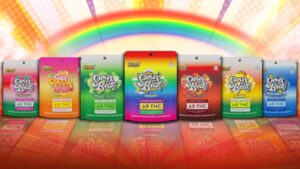You may or may not have heard about a cannabinoid on the market that’s quickly becoming one of the most sought extracts of the hemp plant in existence: Delta-8 THC. In this article, we’ll go over exactly what this cannabinoid is, what it’s used for, and why it’s legal compared to its infamous cousin, Delta-9 THC (marijuana).
What is Delta-8 THC?
Delta-8-Tetrahydrocannabinol (Delta-8 for short) is a legal cannabinoid that can give you a heady high while only containing 0.3% THC, the same as CBD. Delta-8 THC has been around for several decades, but much of the research surrounding this unique cannabinoid was suppressed until a few years ago. Delta-8 THC is considered the “lite” version of weed, as you’re still able to “feel high,” but you’ll remain clear-headed and focused.
Many people who have been scarred by the anxiety and paranoia from traditional weed can enjoy a heady high without spiraling into the strong psychoactive effects weed is known for. If you’ve had a bad experience with Delta-9 THC but wistfully yearn for the “good” portion of the high, what you are looking for might be Delta-8 THC.
What are the Effects of Delta-8?
The effects of Delta-8 are a little tricky to describe, as while it only contains 0.3% of THC, it can have different effects on different people. Factors like age, weight, height, and so forth can diversely affect the user’s Delta-8 experience. However, there are a few things that the user can expect to happen while using Delta-8 THC, either consistently or for the first time.
Does Delta-8 Get You High?
The short answer is yes, Delta-8 will cause you to feel high. But, a more controlled and clear-headed high. Marijuana – or Delta-9 THC – can cause extreme paranoia and anxiety for some users, making it an unpleasant experience overall. While Delta-8 THC offers a more relaxed and controlled high, taking too much of it can cause unpleasant anxiety and drowsiness.
Will Delta-8 Cause You To Fail A Drug Test?
Unfortunately, taking Delta-8 THC can cause you to fail a drug test. Drug tests only test for the presence of THC metabolites, which are what your body uses to break down THC. Regardless if your body breaks down the meager 0.3% THC content in Delta-8 THC or the full-blown THC from marijuana, there will be metabolites in your body that the drug test will detect.
There isn’t much recourse for distinguishing which product you take, so trying to explain to your employer why you failed a drug test probably won’t go over well. If you need to take drug tests for work, it’s best to abstain from taking Delta-8 THC products for a few months to allow the metabolites to disappear.
What Does Delta-8 Feel Like?
The most common effect of Delta-8 THC is a state of happiness and relaxation. Some users report drowsiness and anxiety when taking it for the first time, but as your body grows more accustomed to it, these effects will diminish. It is not recommended that you drive or operate machinery when taking Delta-8 THC, as the sleepiness and heady high can impair you from making quick decisions or sharp judgment calls.
Furthermore, Delta-8 THC can help you sleep, as the drowsiness brought on by Delta-8 allows your mind to relax and sink into a restful slumber. It can cause you to feel “floaty” or weightless, as well as more focused.
What is the Difference Between Delta-8 and THC?
The main difference between Delta-8 THC and Delta-9 THC is quantity. As we mentioned before, Delta-8 THC only contains 0.3%, whereas traditional marijuana contains much more. The effects of Delta-8 and Delta-9 are somewhat varied as well.
Delta-8 THC sidesteps the paranoia and anxiety brought on by taking too much THC and can offer a more controlled high, allowing the user to remain clear-headed and in control. Lastly, Delta-8 THC is legal in quite a few more states than traditional marijuana is, though many states are now legalizing both the recreational and medicinal use of marijuana.
What is Delta-8 Most Commonly Used For?
Delta-8 THC is most commonly used for anxiety, depression, a sleep aid, an appetite encourager, and others. Medically, Delta-8 has been studied to reduce nausea caused by chemotherapy, corneal injuries, glaucoma, and vomiting. However, it can be used as an alternative to weed as it does get you “high,” just not as strong of a high as marijuana.
What Are The Most Common Benefits of Delta-8?
Aside from the usual benefits of “getting high,” like increased appetite, relaxation, reduced anxiety, and sleepiness, there are several encouraging benefits that the user can harness. Some of these benefits include:
Healthier Brain
Using Delta-8 THC has been seen to increase overall brain health by producing the chemical Acetylcholine. This neurotransmitter controls mental cognition, arousal, memory, and neuroplasticity. Continued use of Delta-8 THC has been proven to help the user develop healthier brain functions.
Reduces Chemotherapy Nausea
If you or a loved one are battling the horrible side effects of chemotherapy, Delta-8 may be able to help with that. In 1995, a study was conducted among young children going through chemotherapy treatments. Delta-8 THC was able to completely eliminate nausea in over 480 chemotherapy treatments.
Pain Management
Delta-8 THC contains analgesic properties, allowing the body to target and relieve pain areas. Users looking to treat neuropathy, inflammation (i.e., from arthritis or even just a big day at the gym), and other painful issues may find relief with using Delta-8 products. If you’re looking to reduce pain from any of these issues, Delta-8 can offer some ways of managing the pain to more tolerable levels.
What Are The Most Common Side Effects of Delta-8?
The side effects of Delta-8 THC are similar to those of Delta-9 THC (marijuana). You may experience a mild case of the munchies, as well as some paranoia/anxiety if taking it for the first time. You may experience nausea and dry mouth, as well as grogginess if taking too much.
Nevertheless, you may also experience heightened sensitivity to touch, which can be pleasurable for some. Lastly, you may experience slight nasal pressure or headaches if your body is sensitive to THC.
What Are The Most Common Types of Delta-8 Products?
Just like CBD, there are quite a few types of Delta-8 THC products that are regularly available. Unless you have no plans for the day and have a few hours to kill, Delta-8 THC is best consumed at night. Let’s go over a few of these now.
Tinctures & Oils
Tinctures and oils are the most common and preferred method of CBD, as it takes no special equipment to use and can be absorbed into the bloodstream faster. Since the tincture is absorbed sublingually (underneath your tongue), it can bypass the digestive system and offer the full benefits reasonably quickly.
Topicals & Creams
Delta-8 THC is available in topicals and creams, but these are more common for CBD products. If you’re looking to experience a heady high, you may be disappointed. The Delta-8 in topicals will most likely target the painful area for pain relief, but since it is not absorbed past the dermal layer, it won’t cause you to feel any high as it cannot be probably absorbed by the bloodstream.
Capsules
Capsules are a straightforward method of taking Delta-8 THC. However, since the capsules must be digested properly, much of the Delta-8 THC ends up going to waste, and your body gets a very small percentage of the Delta-8 THC. The amount of Delta-8 that is able to be absorbed is also known as bioavailability. Taking Delta-8 THC as a vitamin first thing in the morning isn’t recommended, as the euphoria mixed with drowsiness can negatively affect your productivity.
Vapes & Extracts
Delta-8 THC vapes and extracts are an excellent method for consuming Delta-8 THC because the vapor is directly absorbed by the lungs. As the lungs absorb the vapor, the Delta-8 THC can enter the bloodstream quickly. Vapes and extracts are a little more tedious to consume, as you must have a special vape pen device that can properly convert the liquid to a vapor.
Flower
Delta-8 THC is naturally found in the cannabis flower but in very small quantities. To utilize the Delta-8 THC in flowers, there is a tedious and extensive extraction process to harvest the Delta-8 isolate. The isolate itself can be consumed, but it is more beneficial to consume Delta-8 in a processed form.
Technically, Delta-8 flowers don’t exist, so must be created. This is why you should do your research before buying anything labeled as a “delta-8 flower.” Utilizing the Delta-8 flower requires much more familiarity with smoking (either tobacco or marijuana).
The buds must be removed, crushed, and filled into either an herbalizer or an empty cigarette in order to be used. The resulting smoke can be directly absorbed into your lungs and bloodstream as it is inhaled, circumventing the digestive system completely.
How Long Does Delta-8 Take to Work?
Different products will have varied time frames of when they will start to work. For example, the Delta-8 in cartridges works much faster than capsules and topicals. Since the vapor from the cartridges is absorbed directly by your lungs and into your bloodstream, cartridges and vape juice can start to work in as little as six minutes! Gummies and other edibles have an extremely varied effect time, anywhere from 30 minutes to several hours to kick in.
How Long Do the Effects of Delta-8 Last?
Again, different products can last longer than others, depending on the product you take. Tinctures will last longer than edibles because it is more easily absorbed into your bloodstream. Some products can last anywhere from 2-5 hours but may take 30 minutes or more to fully kick in.
How Long Does Delta-8 Stay in Your System?
Delta-8 THC can remain in your system for several days, even months, after it’s been consumed. Delta-8 THC remains in your blood and saliva for about two days and will stay in your urine for about 48 days. If you use Delta-8 THC products regularly, these time frames are compounded.
Are There Any Drug Interactions with Delta-8?
Since Delta-8 THC is so new to the market, there has yet to be substantial research to conclude if there are any drug interactions with this cannabinoid. CBD is known to restrict the production of CYP3A4, an enzyme that is used to break down common prescription drugs, such as opioids and antidepressants. If you’re worried about Delta-8 interfering with your prescription medication, you should abstain until new research is available. Or speak to your prescribing healthcare provider.
Are Delta-8 Products Legal?
Delta-8 THC products are legal for purchase in nearly all 50 states. Thanks to the 2018 Farm Bill, as long as a product contains less than 0.3% THC, it can be purchased without legal backlash. However, some states have different age requirements, so you’ll need to confirm that you can purchase Delta-8 products in your state if you are under 21.
Where Can You Buy Delta-8?
Delta-8 THC can be purchased from both online and brick-and-mortar shops. For most online sites, you will be required to consent to an age verification method (uploading your ID or clicking a button to confirm your age) before you are allowed to purchase anything. Most brick-and-mortar shops will require a quick ID check before allowing you to view or purchase anything in-store.
How Old Do You Have to Be to Buy Delta-8?
You must be 21 to legally purchase any Delta-8 THC products. To date, there is no federal regulation on the minimum age, but most states will firmly require the customer to be 21 years old, and show some form of ID before allowing the product to be purchased.
How Do You Know Your Delta-8 Is High Quality and Reputable?
Since Delta-8 THC products are not regulated by the FDA, it’s possible for anyone to produce and sell Delta-8 products. The best way to confirm that you have reputable and high-quality Delta-8 THC is to check for third-party independent lab testing. You should also check reviews and forums to see which companies have the best products and how people react to them. This option may be more limited as people are still discovering and learning about Delta-8 THC today.


